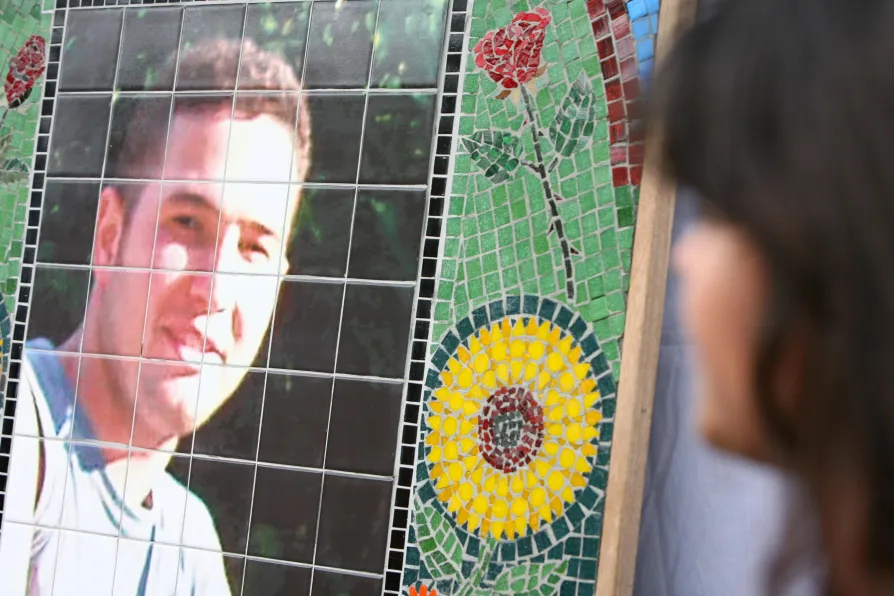
 Vivian Figueiredo (right), cousin of Jean Charles de Menezes, looks across at a mosaic of Jean outside Stockwell Tube station in south London where he was shot dead by police, July 22, 2009
Vivian Figueiredo (right), cousin of Jean Charles de Menezes, looks across at a mosaic of Jean outside Stockwell Tube station in south London where he was shot dead by police, July 22, 2009
TWENTY years ago tomorrow, a 27-year-old electrician, Jean-Charles de Menezes, walked into a Tube station, tapped through the ticket barriers and boarded a train.
He sat in a corner seat. Then police stormed in, leapt on him and shot him in the head repeatedly at point-blank range. He was killed.
London was on alert because of the recent July 7 2005, bombings and an attempted terrorist attack the previous day. Officers had wrongly locked onto Menezes as a suspect. Within 24 hours, they admitted their mistake and apologised.
The police line? A tragic accident. Officers thought the man they were following might plan to explode a bomb, killing dozens. They had to act fast and were not to blame.
This wasn’t true, however, as the determination of de Menezes’s family and a small group of campaigners was to expose.
The awful story of de Menezes’s execution — the Morning Star called it out as such on our front page at the time — has continuing relevance about the lethal consequences of an unaccountable, racist and dishonest police force.

De Menezes was the victim of an unannounced shoot-to-kill policy.
Police smeared the dead man’s character to cover their backs. He was said to have run from officers, to have reacted aggressively to being challenged. Evidence would later debunk the idea that he ever ran from officers or that they tried to challenge him before shooting.
Smears would continue for years, part of the police toolkit insinuating that even if a victim is innocent, he is somehow a wrong’un. The intent is both to diminish public interest and to assuage fears that police who chase a random man onto a train and kill him might do it to anyone.
The lies about his behaviour served to obscure the reasons police were following him (one of which, notes from an officer later admitted, was his “Mongoloid eyes” — this is a case about racism, too) and what principles they followed when deciding to shoot.
Secrecy over the real instructions officers work to continues. It has important consequences even in less extreme scenarios.
When police parted to allow Palestine demonstrators to lay flowers in the road in January, then accused them of breaching police lines and made mass arrests, was that what they’d been told to do? When, last week, an officer told a protester in Canterbury that “mentioning freedom of Gaza, Israel, genocide, all of that” is proscribed as support for Palestine Action, were they throwing their weight around or acting on instructions to push the boundaries of the law to intimidate and silence?
The spycops inquiry showed the de Menezes campaign was among many police sought to infiltrate, an especially sick operation since the grieving family they tried to discredit had been bereaved by them in the first place.
The incompetence, racism and mendacity of the officers involved in the killing and cover-up have long been exposed, but no-one has ever been held accountable.
Nor did responsibility for an operation that killed an innocent man even blot the career of the commander who authorised it: Cressida Dick went on to become Met Commissioner, the highest-profile police officer in the country.
Her defenders argued any penalty would deter officers from making decisions under pressure, though we might wish for police to be more worried about killing the innocent than about potential demotion.
Nothing has changed. The spycops saga revealed a whole shadow world of dishonest undercover policing.
The Sarah Everard murder and leaked messages revealing racist, sexist and homophobic “banter” by officers prompt brief criticism, while the power of police over us is increased by government after government. It matters that they are not trustworthy.
Remember Jean-Charles de Menezes. His story is a warning about a state that lies, that slanders the innocent and blames the victims, and that puts no great value on human life.










